Citation
Othman, Radziah and Panhwar, Qurban Ali and Naher, Umme Aminun
(2014)
Role of phosphate-solubilizing bacteria on the growth of aerobic rice.
Lambert Academic Publishing, Germany.
ISBN 3659620211/9783659620218
Abstract
Rice (Oryza sativa L.) serves as a staple food for more than three billion people worldwide. Aerobic rice requires the same amount of nutrients as flooded rice, but in the former, there is a problem of phosphorus (P) availability, due to its fixation with other elements. In the soil, P becomes unavailable due to fixation and immobilization and about 70-90% phosphatic fertilizers become fixed in soil. Microorganisms play an important role in agriculture by supplying nutrients to the plants and reduce the demand of chemical fertilizers. Microorganisms, especially phosphate-solubilizing bacteria (PSB) have the ability to solubilize, insoluble P in soil and reduce inputs of chemical fertilizers. Besides PSB are also capable of producing indole-3-acetic acid, a phytohormone known to be involved in root initiation, cell division and cell enlargement. Furthermore, these strains have ability to stimulate the growth of roots and shoots and increased 32P-labeled phosphate uptake in the plants.
Download File
![[img]](http://psasir.upm.edu.my/38031/1.hassmallThumbnailVersion/Role%20of%20phosphate-solubilizing%20bacteria%20on%20the%20growth%20of%20aerobic%20rice.pdf)  Preview |
|
PDF (Book cover)
Role of phosphate-solubilizing bacteria on the growth of aerobic rice.pdf
Download (319kB)
| Preview
|
|
Additional Metadata
Actions (login required)
 |
View Item |

